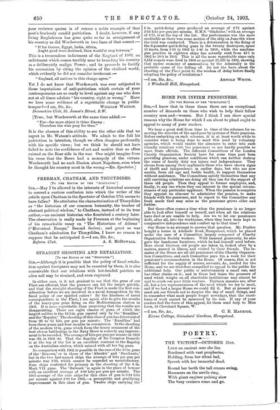HOME FOR INFIRM PENSIONERS.
[TO THE EDITOR OF THE "SPECTATOR."]
Sra,—I know that in these times there are an exceptional number of demands on those who wish to help their fellow country men and—women. But I think I can show special reasons why the Home for which I am about to plead ought to appeal to many of your readers.
We hear a great deal from time to time of the schemes for re- moving the miseries of the aged poor by systems of State pensions. Before embarking on such schemes, it is at least worth while to consider what is being done to meet this need by voluntary agencies, which would enable the almoners to enter into such friendly relations with the pensioners as are hardly possible to mere State officials. The different Committees of the London Charity Organisation Society have for some time past been providing pensions, under conditions which can neither destroy the sense of family duty nor injure real independence. They choose from among their applicants those who have shown signs of thrift and independence in earlier days, but who are now unable, from old age and feeble health, to support themselves without assistance. The Committees satisfy themselves that any still surviving relations are doing all they can for the support of these old people. Then they appeal to former employers, and, finally, to any one whom they can interest in the special circum- stances of any particular applicant. When the pension is complete they appoint an almoner to administer the pension, to make friends with the pensioner, and to report to the Committee any fresh needs that may arise as the pensioner grows older and feebler.
But there often comes a time when the pensioner is no longer able to look after himself or herself, and when all the relations have died or are unable to help. Are we to let our pensioners drift, after all, into the workhouse, when they have been kept in comparative independence and comfort up to that time ?
Our Home is an attempt to answer that question. Mr. Poulter bought a house in Adelaide Road, Hampstead, which he placed under the care of a Committee largely composed of Charity Organisation Society workers. With unusual generosity, he also gave the handsome furniture, which he had himself used before. Here about thirteen old people are taken in, looked after by a matron, nursed in illness, and visited by their friends. The in- mates of the Home are all old pensioners of the Charity Organisa- tion Committees, and each Committee pays 10s. a week for their pensioner's accommodation in the Home. Of course, this is not sufficient for the supply of nurses, servants, dre., needed for the Home, and we are therefore compelled to appeal to the public for additional help. Our public is unfortunately a small one, and has other claims on it; and in these bad times the pressure of need which weighs on all charitable institutions may almost be said to crush our poor little venture. Thirteen inmates are, after all, but a few representatives of the need which we try to meet, and if we had a larger Home we could fill it. But at present we must ask our friends not to despise the day of small things, and to remember what most people forget nowadays, that the excel- lence of work cannot be measured by its size. If any of your readers feel the force of this appeal, let them send help to Miss Leon, 13 Cleveland Square, W.
Eirene Cottage, Gainsboro' Gardens, Hampstead.






















































 Previous page
Previous page